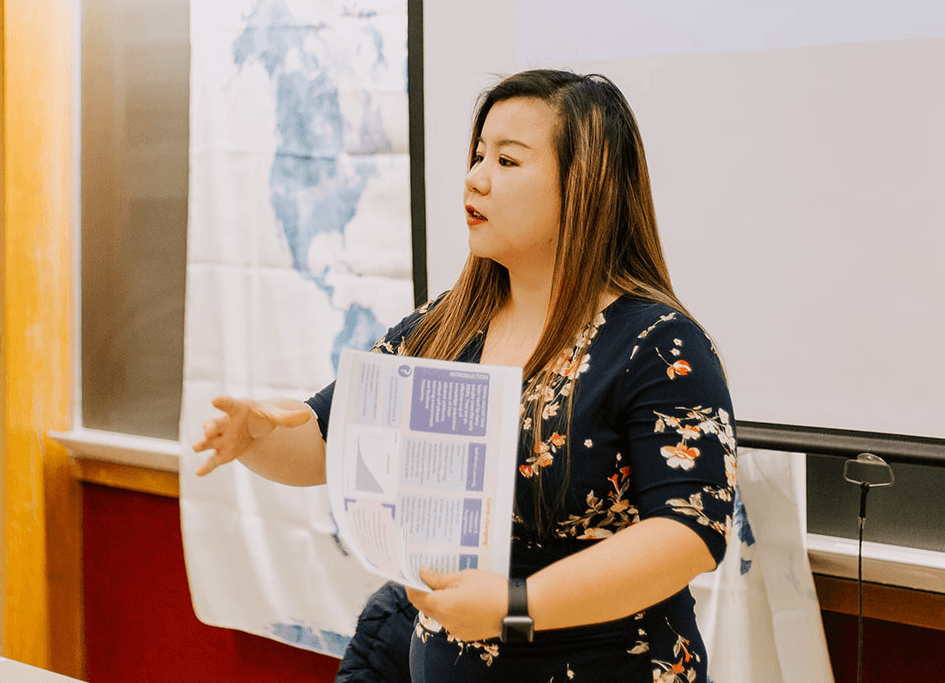From Classroom to Conference: Undergrads Take their Research Projects to the Next Level
May 08, 2023
As undergraduate students at a research institution, we are surrounded by opportunities that can elevate our educational experiences. One such path is conducting research guided by faculty and organizations such as the Office of Undergraduate Research (OUR). Even with guidance, we sometimes feel we lack the abilities or drive to begin what appears to be a strenuous journey on top of regular coursework. However, Introductory Composition classes at Purdue can serve as a perfect gateway for first year students wanting to pursue their research passions. This article explores how students can get involved in research and learn the skills they need to accomplish their goals using ICaP courses as a springboard. But first, let’s discuss some of the reasons students should pursue undergraduate research.
Why Pursue Undergraduate Research Opportunities?
I spoke with the Journal of Purdue Undergraduate Research Editorial Editor Catie Gilhooly about the benefits of publishing undergraduate research. Gilhooly has been with the journal since 2021 as part of the student editorial board and acts as a liaison between the journal, students, and faculty. Of the many benefits to publishing undergraduate research, Gilhooly states that “having publishing experience while in undergrad is a rare opportunity that shows interdisciplinary communication skills on a resume or curriculum vitae for research positions and graduate school applications.” The transferable skills you gain while conducting research, whether you’re in the lab or presenting ideas, prove to future employers or acceptance committees that you have the skills to explain and defend your work. Additionally, undergraduate research allows you to explore your career path, and could perhaps open up new areas of interest.
At Purdue, JPUR offers a unique opportunity for undergraduate students to be fully recognized for research. Gilhooly explains that undergraduate JPUR authors receive full rights to their published work. Students are also able to submit work regardless of the stage of the project, whether it is in progress or completed. By taking advantage of such research opportunities, Purdue undergraduate students can enrich their educational experiences and gain a leg-up on future academic and career goals.
How Do ICaP Courses Support Undergraduate Research?
In general, ICaP course outcomes support the growth of foundational research skills. In English 106 and similar courses, students must develop their critical thinking by reading and analyzing different genres of writing. In class projects, students learn how to conduct secondary research and evaluate the credibility of their sources. Furthermore, they must learn to communicate their knowledge clearly with an understanding of their audience. ICaP also supports interdisciplinary learning, and allows students to explore whatever research passions they have by allowing them to pick their own topics. Students will learn more about a topic that interests them and be able to situate themselves within the current research conversation.
 Dr. Fiona Wang is one of many ICaP instructors that encourages their students to go one step beyond conducting research in the classroom; in fact, she designs her course projects to align with Purdue research symposiums, and incentivizes her students to submit their own research projects to the Undergraduate Research Conference with bonus points for the class. The theme for Wang’s class is “Academic Rhetoric,” which teaches students how to frame their own knowledge within the academic conversation. By project 2, students are expected to conduct research on their desired topic and map current conversations within this topic, situating themselves on one side of the argument with reviewed sources to back them up. Then, in project 3, students will remediate this information into a research poster. Once this project is finished, students have a completed poster that can be entered into Purdue’s Fall or Spring research symposium.
Dr. Fiona Wang is one of many ICaP instructors that encourages their students to go one step beyond conducting research in the classroom; in fact, she designs her course projects to align with Purdue research symposiums, and incentivizes her students to submit their own research projects to the Undergraduate Research Conference with bonus points for the class. The theme for Wang’s class is “Academic Rhetoric,” which teaches students how to frame their own knowledge within the academic conversation. By project 2, students are expected to conduct research on their desired topic and map current conversations within this topic, situating themselves on one side of the argument with reviewed sources to back them up. Then, in project 3, students will remediate this information into a research poster. Once this project is finished, students have a completed poster that can be entered into Purdue’s Fall or Spring research symposium.
Wang emphasizes that by allowing students to choose their topics, students are more engaged in their coursework. Furthermore, by completing their research and being able to show it in a formal setting, students feel a sense of pride and accomplishment in their work. Wang notes that most students in her class tend to struggle with visually representing the data they find. Through structured analysis that students are assigned in classes, they learn to evaluate the relationships between data, and can thus better communicate research visually.
Another ICaP instructor, Dr. Jennifer Hughes, has also found ways to foster students’ interests in data analysis. In the “Engineering in the World of Data” learning community, Hughes and her team, led by professor Michael Witt, worked together to create an interdisciplinary project which challenged students to research and define a data set, and then convey it with data visualizations. Hughes incorporates ICaP outcomes into a STEM based curriculum, and illustrates the utility of writing skills within a student’s skill set. Hughes notes the benefits of her learning community and completing formal research in introductory classes such as ENGL106, stating that they “can lead to amazing opportunities like Purdue’s Research Symposium, summer internship, lab assistant jobs, and so on.”
How Will You Get Involved?

Regardless of field, ICaP instructors will support your growth as an academic, and will instill you with the tools you need to pursue undergraduate research. On its own, conducting research is a valuable experience for undergraduates. By learning to communicate knowledge with an understanding of rhetoric and design, you open up even more opportunities that will enrich your education at Purdue, and by applying these skills to research endeavors, you can demonstrate your ability to communicate complex ideas to an interdisciplinary audience.
If you’d like to get involved in undergraduate research but are scared to take the first steps, don’t worry! ICaP instructors can serve as a great resource to get started.. Ask your instructors about how you can submit your research project to the Purdue Undergraduate Research conference, explore the OUR website for tips on how to approach research mentors and get funding for primary research, and continue to develop your written and oral communication skills by taking classes and utilizing resources such as the Purdue Writing Lab. There are many paths you can take to begin your research, and the most important thing is to approach each opportunity with a curious mind.
 Madison Thogmartin is a junior at Purdue majoring in Professional Writing and minoring in Anthropology. She is from a small town near Kansas City. She loves to read, write, watch movies, and spend time with friends and family. She is a major cat person and is constantly missing her two cats back home.
Madison Thogmartin is a junior at Purdue majoring in Professional Writing and minoring in Anthropology. She is from a small town near Kansas City. She loves to read, write, watch movies, and spend time with friends and family. She is a major cat person and is constantly missing her two cats back home.
